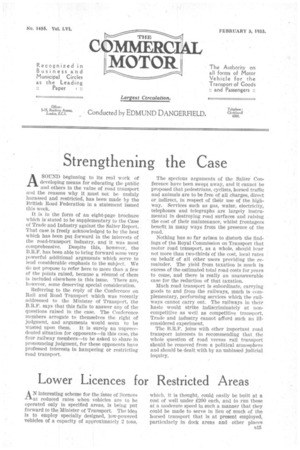Strengthening the Case
Page 29

If you've noticed an error in this article please click here to report it so we can fix it.
ASOUND beginning to its real work of developing means for educating the public. and others in the value of road transport and the reasons why it must not be unduly harassed and restricted, has been made by the British Road Federation in a statement issued this week.
It is in the form of an eight-page brochure which is stated to be supplementary to the Case of Trade and Industry against the Salter Report. That case is freely acknowledged to be the best which has been put forward in the interests of the road-transport industry, and it was most comprehensive. Despite this, however, the B.R.F. has been able to bring forward some very powerful additional arguments which serve to lend considerable einphasis to the subject, We do not propose to refer here to more than a few of the points raised, because a resume of them is included elsewhere in this issue. There are, however, some deserving special consideration.
Referring to the reply of the Conference on Rail and Road Transport which was recently addressed to the Minister of Transport, the B.R.F. says that this fails to answer any of the questions raised in the case. The Conference members arrogate to themselves the right of judgment, and arguments would seem to be wasted upon them. It is surely an unprecedented situation for opponents—in this case, the four railway members—to be asked to share in pronouncing judgment, for these opponents have professed interests in hampering or restricting road transport. The specious arguments of the Salter Conference have been swept away, and it cannot be proposed that pedestrians, cyclists, horsed traffic and animals are to be free of all charges, direct or indirect, in respect of their use of the highway. Services such as gas, water, electricity, telephones and telegraphs are largely instrumental in destroying road surfaces and raising the cost of their maintenance, whilst frontagers benefit in many ways from the presence of the road.
Nothing has so far arisen to disturb the findings of the Royal Commission on Transport that motor road transport, as a whole, should bear not more than two-thirds of the cost, local rates on behalf of all other users providing the remainder. The yield from taxation is nnich in excess of the estimated total road costs for years to come, and there is really an unanswerable case for the reduction of that taxation.
Much road transport is subordinate, carrying goods to and from the railways, much is complementary, performing services which the railways cannot carry out. The railways in their haste would strike indiscriminately at noncompetitive as well as competitive transport. Trade and industry cannot afford such an illconsidered experiment.
The B.R.F. joins with other important road transport interests in recommending that . the whole question of road versus rail transport should be removed from a political atmosphere and should be dealt with by an unbiased judicial inquiry.




























































































